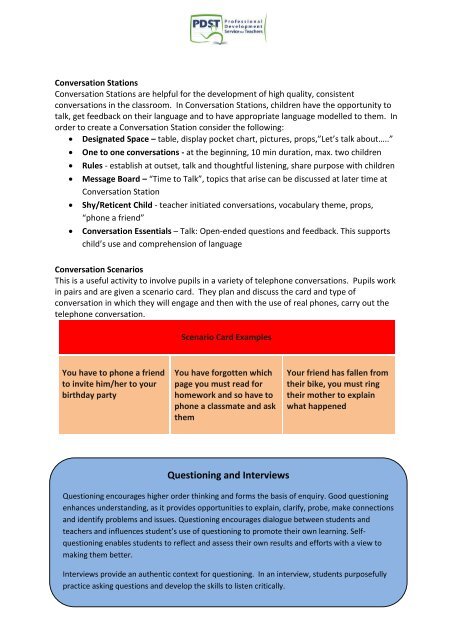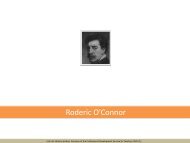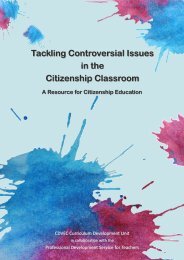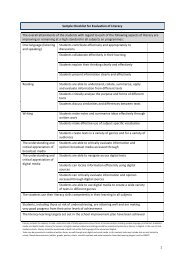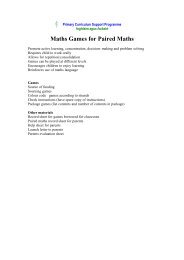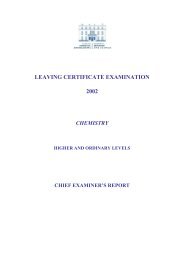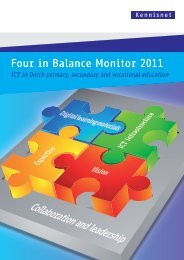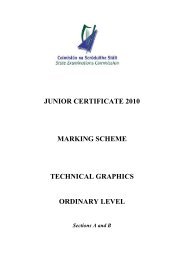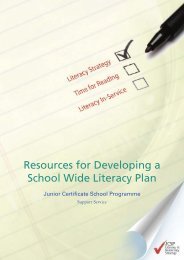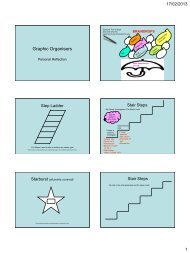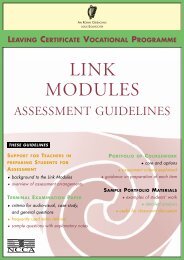Five Components of Effective Oral Language Instruction - PDST
Five Components of Effective Oral Language Instruction - PDST
Five Components of Effective Oral Language Instruction - PDST
Create successful ePaper yourself
Turn your PDF publications into a flip-book with our unique Google optimized e-Paper software.
Conversation Stations<br />
Conversation Stations are helpful for the development <strong>of</strong> high quality, consistent<br />
conversations in the classroom. In Conversation Stations, children have the opportunity to<br />
talk, get feedback on their language and to have appropriate language modelled to them. In<br />
order to create a Conversation Station consider the following:<br />
� Designated Space – table, display pocket chart, pictures, props,”Let’s talk about…..”<br />
� One to one conversations - at the beginning, 10 min duration, max. two children<br />
� Rules - establish at outset, talk and thoughtful listening, share purpose with children<br />
� Message Board – “Time to Talk”, topics that arise can be discussed at later time at<br />
Conversation Station<br />
� Shy/Reticent Child - teacher initiated conversations, vocabulary theme, props,<br />
“phone a friend”<br />
� Conversation Essentials – Talk: Open-ended questions and feedback. This supports<br />
child’s use and comprehension <strong>of</strong> language<br />
Conversation Scenarios<br />
This is a useful activity to involve pupils in a variety <strong>of</strong> telephone conversations. Pupils work<br />
in pairs and are given a scenario card. They plan and discuss the card and type <strong>of</strong><br />
conversation in which they will engage and then with the use <strong>of</strong> real phones, carry out the<br />
telephone conversation.<br />
You have to phone a friend<br />
to invite him/her to your<br />
birthday party<br />
Scenario Card Examples<br />
You have forgotten which<br />
page you must read for<br />
homework and so have to<br />
phone a classmate and ask<br />
them<br />
Questioning and Interviews<br />
Your friend has fallen from<br />
their bike, you must ring<br />
their mother to explain<br />
what happened<br />
Questioning encourages higher order thinking and forms the basis <strong>of</strong> enquiry. Good questioning<br />
enhances understanding, as it provides opportunities to explain, clarify, probe, make connections<br />
and identify problems and issues. Questioning encourages dialogue between students and<br />
teachers and influences student’s use <strong>of</strong> questioning to promote their own learning. Selfquestioning<br />
enables students to reflect and assess their own results and efforts with a view to<br />
making them better.<br />
Interviews provide an authentic context for questioning. In an interview, students purposefully<br />
practice asking questions and develop the skills to listen critically.<br />
19


